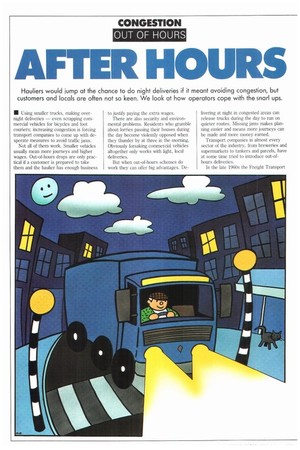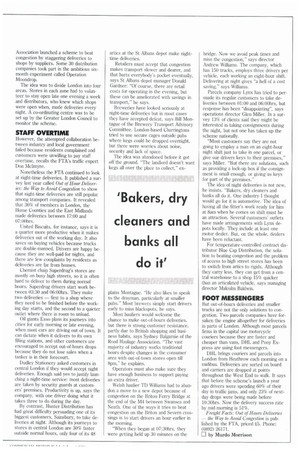AFTER HOURS
Page 32

Page 33

If you've noticed an error in this article please click here to report it so we can fix it.
Hauliers would jump at the chance to do night deliveries if it meant avoiding congestion, but customers and locals are often not so keen. We look at how operators cope with the snarl ups.
• Using smaller trucks, making overnight deliveries — even scrapping commercial vehicles for bicycles and foot couriers; increasing congestion is forcing transport companies to come up with desperate measures to avoid traffic jams.
Not all of them work. Smaller vehicles usually mean more journeys and higher wages. Out-of-hours drops are only practical if a customer is prepared to take them and the haulier has enough business to justify paying the extra wages.
There are also security and environmental problems. Residents who grumble about lorries passing their houses during the day become violently opposed when they thunder by at three in the morning. Obviously forsaking commercial vehicles altogether only works with light, local deliveries.
But when out-of-hours schemes do work they can offer big advantages. De
livering at night in congested areas can release trucks during the day to run on quieter routes. Missing jams makes planning easier and means more journeys can be made and more money earned.
Transport companies in almost every sector of the industry, from breweries and supermarkets to tankers and parcels, have at some time tried to introduce out-ofhours deliveries.
In the late 1960s the Freight Transport Association launched a scheme to beat congestion by staggering deliveries to shops by suppliers. Some 30 distribution companies took part in the ambitious sixmonth experiment called Operation Moondrop.
The idea was to divide London into four areas. Stores in each zone had to volunteer to stay open late one evening a week and distributors, who knew which shops were open when, made deliveries every night. A co-ordinating centre was to be set up by the Greater London Council to monitor the scheme.
STAFF OVERTIME
However, the attempted collaboration between industry and local government failed because residents complained and customers were unwilling to pay staff overtime, recalls the FTA's traffic expert Don McIntyre.
Nonetheless the ETA continued to look at night-time deliveries. It published a survey last year called Out of Hour Deliveries: the Way to Avoid Congestion to show that night-time deliveries are still popular among transport companies. It revealed that 36% of members in London, the Home Counties and the East Midlands made deliveries between 17:00 and 07:00hrs.
United Biscuits, for instance, says it is a quarter more productive when it makes deliveries out of the working day. It also saves on buying vehicles because trucks are double-manned. Drivers are happy because they are well-paid for nights, and there are few complaints by residents as deliveries are far from houses.
Chemist chain Superdrug's stores are mostly on busy high streets, so it is often hard to deliver to them during normal hours. Superdrug drivers start work between 03:30 and 06:00hrs. They make two deliveries — first to a shop where they need to be finished before the working day starts, and the second to a quieter outlet where there is room to unload.
Oil giants Esso plans its journeys into cities for early morning or late evening, when most cars are driving out of town. It can dictate when it delivers to its own filling stations, and other customers are encouraged to accept out-of-hours drops because they do not lose sales when a tanker is in their forecourt.
Dudley Stationery asked customers in central London if they would accept night deliveries. Enough said yes to justify launching a night-time service: most deliveries are taken by security guards at customers' premises. Productivity is up, says the company, with one driver doing what it takes three to do during the day.
By contrast, Hunter Distribution has had great difficulty persuading one of its biggest customers, Sainsbury, to take deliveries at night. Although its journeys to stores in central London are 30% faster outside normal hours, only four of its 48 artics at the St Albans depot make nighttime deliveries.
Retailers must accept that congestion makes transport slower and dearer, and that hurts everybody's pocket eventually, says St Albans depot manager Donald Gardner: "Of course, there are retail costs for operating in the evening, but these can be ameliorated with savings in transport," he says.
Breweries have looked seriously at night-time deliveries but in most cases they have accepted defeat, says Bill Montague of the Brewery Transport Advisory Committee. London-based Charringtons tried to use secure cages outside pubs where kegs could be dropped overnight, but there were worries about noise, security and lack of space.
The idea was abandoned before it got off the ground. 'The landlord doesn't want kegs all over the place to collect," ex plains Montague. "He also likes to speak to the drayman, particularly at smaller pubs." Most brewers simply start drivers early to miss blackspots, he says.
Most hauliers would welcome the chance to make out-of-hours deliveries, but there is strong customer resistance, partly due to British shopping and business habits, says Sydney Balgarnie of the Road Haulage Association. The vast majority of industry works traditional hours despite changes in the consumer area with out-of-town stores open till 8pm," he explains.
Operators must also make sure they have enough business to support paying an extra driver.
Welsh haulier TI) Williams had to abandon a move to a new depot because of congestion on the Briton Ferry Bridge at the end of the M4 between Swansea and Neath. One of the ways it tries to beat congestion on the Briton and Severn crossings is to start drivers an hour earlier in the morning.
"When they began at 07:30hrs, they were getting held up 30 minutes on the bridge. Now we avoid peak times and miss the congestion," says director Andrew Williams The company, which has 150 trucks, employs three drivers per vehicle, each working an eight-hour shift. Delivering at night gives "a hell of a cost saving," says Williams.
Parcels company Lynx has tried to persuade its regular customers to take deliveries between 01:00 and 06:00hrs, but response has been "disappointing", says operations director Glen Miller. In a survey 13% of clients said they might be interested in taking consignments during the night, but not one has taken up the scheme nationally.
"Most customers say they are not going to employ a man on an eight-hour night shift just to take in one parcel, or give our drivers keys to their premises," says Miller. "But there are solutions, such as providing a lock-up box if the consignment is small enough, or giving us keys for part of the premises."
The idea of night deliveries is not new, he insists. "Bakers, dry cleaners and banks all do it. One industry I thought would go for it is automotive. The idea of having all the fitter's work ready for him at 8am when he comes on shift must be an attraction. Several customers' outlets have made arrangements with Lynx depots locally. They include at least one motor dealer. But, on the whole, dealers have been reluctant.
For temperature-controlled contract distributor Blue Cap Distribution, the solution to beating congestion and the problem of access to high street stores has been to switch from artics to rigid& Although they carry less, they can get from a central warehouse to a shop 15% quicker than an articulated vehicle, says managing director Malcolm Baldwin.
FOOT MESSENGERS
But out-of-hours deliveries and smaller trucks are not the only solutions to congestion. Two parcels companies have forsaken the engine altogether for deliveries in parts of London. Although most parcels firms in the capital use motorcycle couriers because they are faster and cheaper than vans, DHL and Pony Express are using foot messengers.
DHL brings couriers and parcels into London from Heathrow each morning on a midibus. Deliveries are sorted on board and carriers are dropped at points throughout the West End to walk. It says that before the scheme's launch a year ago drivers were spending 60% of their day in traffic jams, and only 23% of nextday drops were being made before 10:30hrs. Now the delivery success rate by mid-morning is 51%.
Freight Facts: Out of Hours Deliveries — the Way to Avoid Congestion is published by the FTA, priced £5. Phone: (0892) 26171.
El by Murdo Morrison
















































































































